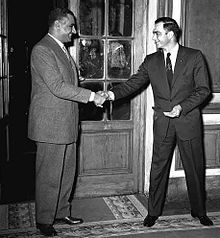Henry A. Byroade
| Henry A. Byroade | |
|---|---|

Ambassador Byroade (right) being received by Egyptian President Gamal Abdel Nasser, 1955
|
|
| 9th United States Ambassador to Afghanistan | |
|
In office 1959–1962 |
|
| President |
Dwight D. Eisenhower John F. Kennedy |
| Preceded by | Sheldon T. Mills |
| Succeeded by | John M. Steeves |
| 12th United States Ambassador to Pakistan | |
|
In office October 15, 1973 – April 23, 1977 |
|
| President |
Richard Nixon Gerald Ford Jimmy Carter |
| Preceded by | Joseph S. Farland |
| Succeeded by | Arthur W. Hummel, Jr. |
| United States Ambassador to South Africa | |
|
In office October 9, 1956 – January 24, 1959 |
|
| President | Dwight D. Eisenhower |
| Preceded by | Edward T. Wailes |
| Succeeded by | Philip K. Crowe |
| United States Ambassador to Burma | |
|
In office September 10, 1963 – June 11, 1968 |
|
| President |
John F. Kennedy Lyndon B. Johnson |
| Preceded by | John Scott Everton |
| Succeeded by | Arthur W. Hummel, Jr. |
| Personal details | |
| Born | July 24, 1913 Maumee Township, Allen County, Indiana |
| Died | December 31, 1993 (aged 80) Potomac, Maryland |
Brigadier General Henry Alfred Byroade, (July 24, 1913 – December 31, 1993) of Indiana was an American career diplomat. Over the course of his career, he served as the American ambassador to Egypt (1955–1956), South Africa (1956–1959), Afghanistan (1959–1962), Burma (1963–1968), Philippines (1969–1973), and Pakistan (1973–1977).
Byroade graduated from West Point in 1937 and began as a career Army officer. His first post in army was on the Hawaiian Islands as a member of the Corps of Engineers from 1937 to 1939. The Corps sent him back in 1939 to engineering college. He got his master's degree in civil engineering from Cornell University in 1940 before being stationed at Langley Field, Virginia, helping to form the first aviation engineer regiment. In 1946, at the age of 32, he rose to the rank of Brigadier General. In 1949 he was seconded to the U.S. Department of State, where he headed the Office of German Affairs. In 1952, he made the decision to resign from the Army, and was appointed Assistant Secretary of State for Middle East, South Asia and Africa—a post he held until 1955.
In 1954 he attracted criticism from both Israel and the Arab world for the administration's policy declaration in which he told the Israelis, "You should drop the attitude of a conqueror and the conviction that force is the only policy that your neighbors will understand," and told the Arabs, "You should accept this state of Israel as an accomplished fact." That same year, he referred to Israel's Zionist ideology and its free admission of Jews through the Law of Return as "a legitimate matter of concern both to the Arabs and to the Western countries."
...
Wikipedia
